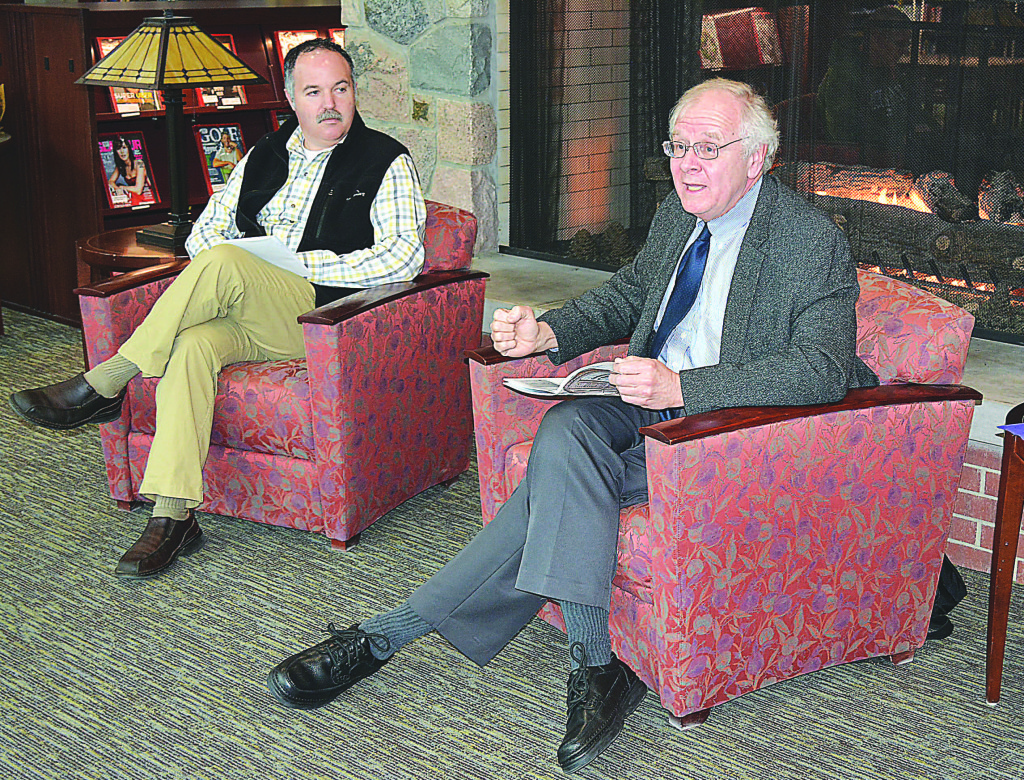
Newspapers have been around for more than 200 years in Michigan, but their continued survival depends upon one thing – money.
“Newspapers . . . are not public services,” said Frank Boles, director of the Clarke Historical Library at Central Michigan University. “We tend to talk about our community newspaper . . . and how it serves our needs.”
But people often forget a newspaper’s “goal is to make money.”
“If you don’t make money, you don’t have a community newspaper. It goes away,” Boles said.
That was just one facet of Boles’ message during the Jan. 13 fireside chat he participated in at the Oxford Public Library.
Boles was there for the grand opening of “Celebrating Two Centuries of Michigan Newspapers: 1809-2009,” a traveling exhibit from the Clarke Historical Library.
The exhibit is on display at the Oxford library now through Feb. 17. With it are various newspaper-related artifacts on loan from the Northeast Oakland Historical Society/Museum and the Oxford Leader, the town’s newspaper since 1898.
During his fireside chat, Boles provided a thumbnail sketch of the history of Michigan newspapers.
He talked about the 19th-century’s highly-partisan publications owned by political parties and politicians, and used to advance their agendas. From there, Boles went on to explain the rise of newspapers designed for a mass audience and financed by advertising sales.
He noted how the state used to have many newspapers geared toward specific ethnic populations, such as German and Dutch immigrants.
Boles also touched on the decline of newspapers caused by competition from radio and television.
Looking to the future, Boles said “truthfully, the large, mass-distribution papers,” such as the Detroit News and Free Press, “are in trouble” due to shrinking readership and decreased advertising revenue.
But he does believe newspapers can still be “a fairly profitable business . . . if they’re well-written and if they’re focused very intently on local news.”
Local is key.
“You don’t need to hear about what Donald Trump just did from your local newspaper because you can watch CNN or get on the Web,” Boles said.
People read their local newspapers, according to Boles, to find out who won the high school football game, to see those “cute” pictures of kids in the holiday plays and to keep up with what’s happening in their local governments.
As long as they follow an “intense local model,” community papers should be all right because they cover things the major newspapers, radio and TV do not, Boles said.
Boles also discussed the issue of digitally archiving back issues of newspapers for historical preservation and research purposes, and making them available to the public via the internet.
But again, money is the main factor.
“In a perfect world, every newspaper would be online, but the perfect world isn’t funded,” Boles said.
Putting back issues online is a “very expensive” proposition between the initial and on-going costs, he explained.
This is an especially difficult undertaking when it comes to community papers because there’s not a broad market for them given the narrow focus of their coverage, so funding sources are extremely limited.
Boles said in many cases, the only way it’s going to happen is through local efforts involving historical societies, libraries, even community fund-raising efforts.
Boles estimated that approximately 14 million pages of newspaper have been published in Michigan’s history. Of those, about eight million are preserved on microfilm and probably a third to half of those are online.
“There’s a lot of stuff that just isn’t available,” he said.

Leave a Reply